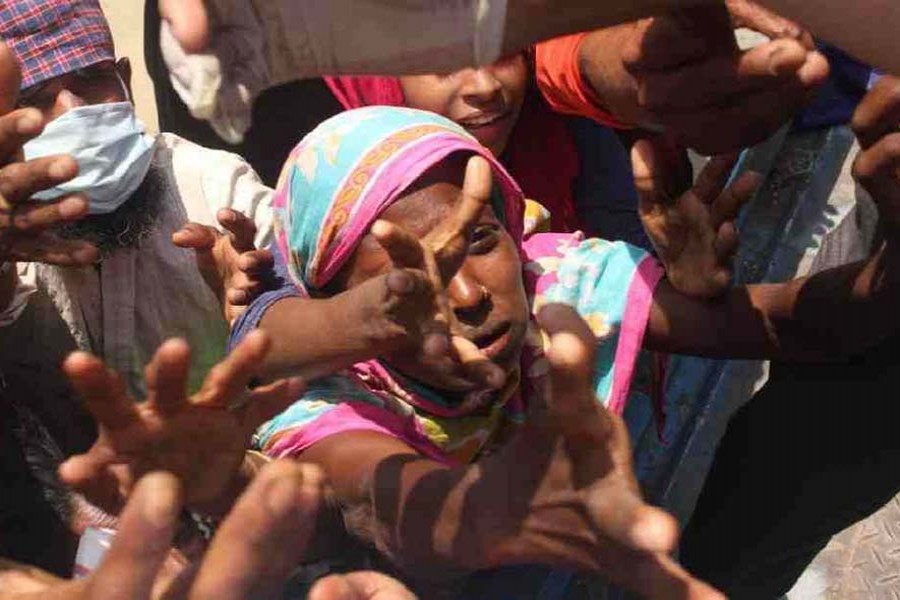As the US dollar continues to rocket up, world's other currencies are tanking. This is driving up the prices of goods and services everywhere. In Bangladesh, the unrestrained price hike of essential commodities has been in large measure due to depreciating taka against the US dollar. A bulk of the main essential commodities including edible oil, sugar, wheat, spices, including a substantial quantity of the chief staple, rice, is imported. And as the payments for these imported essentials are made in US dollar, the costs of these items in taka are naturally going through the roof. Rise in transport cost of these essential items due to high price of fuel oil and natural gas also adds to their market price. These are also the common arguments the importers and wholesalers of the essential commodities offer to justify the runaway price hike of foods and other staples in the market. But while presenting their argument, the traders do not tell the whole truth. It is that they often use the international situation as an excuse to create an artificial crisis in the market with an ulterior motive to raise the price of essential commodities arbitrarily.
While the traders have their right or wrong reasons to explain away the excessive price hike of essential goods, the consumers, especially, those in the low and the very low income group have none. For, they are powerless and have none to listen to their story of why they cannot afford to buy the high-priced staple items from the market. If they are employed, their wages or salaries have not increased. One can easily imagine the state of those who have no job or live from hand to mouth.
How can they survive in such a time of extreme price volatility of the essential commodity market? As a last resort, it is the government to whom the poorer segment of the population-the largest segment, to be exact-has to go to for support. So, the government should play, as it did during the pandemic, its role to cushion the less privileged population against the shock of high inflation. Since the trading community is having a field day with the unprecedented price hike, they have no reason to claim any financial support from the government in these difficult times as they did during the pandemic. This time the government's entire focus should be on the low-and-very low-income population and extend the needed financial support to them so they may survive the current economic uncertainties.
The measures may include widening the scope of the Open Market Sale (OMS) of essential commodities through the government agencies like the Trading Corporation of Bangladesh (TCB) across the country. It is worth noting at this point that meanwhile the TCB-listed items have registered another spell of price hike by 50 per cent. Under the circumstances, the government should think of lowering the prices of OMS-items further so that those remain affordable to the poor consumers. At the same time, the basket of the essential items to be sold through OMS needs also to be expanded to cover the basic necessities of the group of consumers under consideration. In a similar vein, the government should introduce a rationing system for basic food items and reach those to the target population. The government's robust role in ensuring distribution of food and other basic necessities to the people in need and that too at an affordable price is accepted and in practice globally. The government has to intervene at such times to keep the economy on course. Stories of human suffering have no place in the narrative of market economy as it is too obsessed with profit.
When the market is blind to the condition of the poor, what other institution is there to come to the aid of the low income and incomeless people? Here comes the role of the government. Even the advanced, neoliberal Western pro-market economies, which are against the intervention by the government in the affair of business and for cutting government spending on social programmes have themselves to depend on the government support in the shape of bailout measures in time of crisis. It happened during 2008's great financial crisis. One may recall here that during that time, the US government came to the rescue of the failing private financial institutions and other businesses with a fat bailout package worth US$700 billion under the so-called Emergency Economic Stabilization Act. The amount, through what it termed Troubled Asset Relief Program (TARP) was to buy 'toxic assets' from banks. Actually, the government protected the delinquent private businesses at the expense of public money. A comedown indeed for the believers in market as the ultimate arbiter!
Again, in the current financial crisis when the world economy, driven by uncontrolled inflation, is fast heading for another recession, it is the government that is going to be the last resort for the corporate houses, the main pillars of the neoliberal market capitalism, to keep afloat. The fallout of this turn of events is that the general public, who keep a government going with their support and tax-money, are being crowded out by the big business when it comes to financial support during crisis time.
This is happening in the advanced economies where market capitalism rules. In less advanced economies with a fledgling market like Bangladesh's, the problem is more pronounced. So, the government here is in a state of constant balancing between how much its state resources should be used for the public and how much for businesses. Of course, the need of the people should get the highest priority.


